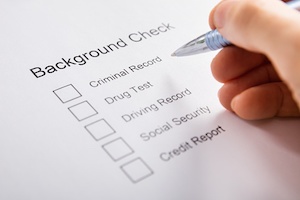
A pre-employment background check is a step in the hiring process that a company uses to verify that a job candidate is who they claim to be. It also provides an opportunity for that person's criminal record, education, employment history and more to be reviewed. Most background checks can be completed between three days to one week. This is an important step that should not be overlooked during the hiring process after reviewing resumes, interviewing potential candidates and nailing down your list of finalists.
EEOC: What Employers Need to Know About Pre Employment Background Checks
What is Included in a Pre-Employment Background Check?
The background check will reveal different information applicable to that check, and each piece of information is very important to the puzzle. A background check helps the company stay safe through the criminal history check. It helps ensure that applicants can do what they claim they can through employment and education verification. This helps protect the company, the employees, and clients. When a pre-employment background check is conducted, it can include the following information based on the company and job type:
- Employment
- Education
- Criminal records
- Credit history
- Motor vehicle and driver’s license records
- Professional licenses
It’s recommended the pre-employment background check come later in the process so that an employer can determine whether the candidate has the experience, education and skills to do the job before knowing things about the candidate’s past, like his or her criminal background.
To further that point, a new movement called “Ban the Box” is aimed at persuading employers to remove the box on employment applications that asks if applicants have a criminal record. The idea is not that employers should not know a candidate’s background, but that they should consider a job candidate’s qualifications first, without the stigma of a conviction in their past.
So far, 150 cities and counties across the country are putting these regulations into place. Likewise, 30 states have adopted some type of statewide laws or policies regarding inquiries about criminal histories during the application process.
EEOC Guidance on Convictions Discovered During a Pre-Employment Background Check
If a conviction comes back as part of the pre-employment background check, The EEOC’s guidance directs employers to consider all of the following factors before making a decision about whether to hire the candidate:
- The nature of the conviction (whether or not it was a violent crime)
- Whether or not the crime is related to the job
- How much time has passed since the crime
- How many times similar crimes were committed
- The age of the applicant at the time of the conviction
During the application process, make sure to disclose your intention to conduct a pre-employment background check and have your potential employees sign an acknowledgement. The employment application should include the following:
- A request for the applicant’s general information (name, address and other contact information, work experience, sometimes education (not dates), etc.)
- Verbiage certifying validity of information
- A place for the applicant to sign
What Not to Ask During the Pre-Employment Background Check
Whether it’s a part of the pre-employment background check or part of the application process, avoid asking potential candidates about protected classes which include:
- Gender
- Race
- National origin
- Dates of diplomas, degrees or certifications
- Age or birthdate
- Citizenship
- Social Security data
- Past use of FMLA
- Worker’s compensation claim history
- Disability information
- Driver’s license information (though you can state if one is required for the position)
- Salary History (this is restricted in some localities)
It is illegal to ask job candidates about any protected classes. Keep in mind that having blanket policies that restrict hiring individuals with criminal backgrounds can inadvertently discriminate against minorities because minority arrests and convictions are statistically higher.
Pre-Employment Background Check Adverse Actions
When reviewing a pre-employment background check, you may choose not to hire an employee based on his or her past. An employer who takes adverse action must believe in good faith that:
- The conviction will have a negative impact on a candidate’s ability to do the job.
- The conviction will harm or cause injury to people, property, business reputation or business assets.
For example, if you are recruiting for a receptionist position and the candidate’s background shows he or she has a DUI arrest; it may not carry much weight since this candidate will not be driving your company vehicles. However, if you were recruiting for a truck driver, then certainly that may change the outcome of your decision.
At FrankCrum, we help our clients establish a pre-employment background check policy that ensures the appropriate treatment of applicants and employees who have either committed criminal activity prior to employment or become involved in criminal activity during employment. Employers must follow all relevant EEOC, FCRA, federal, state, and local regulations. As a bonus, FrankCrum provides criminal record background services to its clients.



.png)

